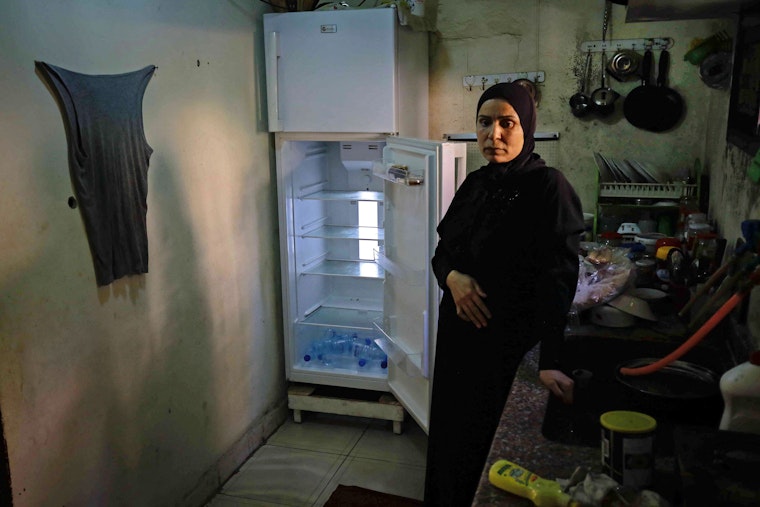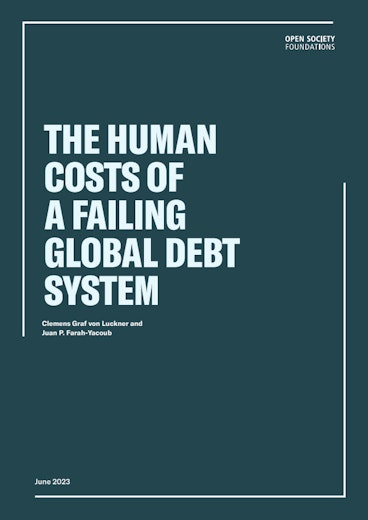
A combination of multiple shocks—chief among them the COVID-19 pandemic and increased interest rates—has left over 50 lower- and middle-income countries in “debt distress,” according to the UN: struggling to repay money borrowed to fund vital projects, or to import food and other essentials. If debt repayments become impossible, a government typically has to “declare default,” letting its creditors know that further repayments under the original terms are no longer possible. Debt defaults cause substantial and long-lasting economic damage—damage that continues until a country’s finances are straightened out. But currently, the global system for doing that also needs fixing.
What happens when a country defaults?
For ordinary people, a default means higher food costs from inflation, as the government prints money to cover its costs. It means unemployment, as businesses and government agencies cut spending. And it means reductions in essential services such as health care and education. All this increases political pressure on a government to resolve the default as rapidly as possible.
A country cannot simply declare bankruptcy as a private business might do. Instead, the government needs to start a restructuring process, meaning renegotiating the contract terms of its debt with all its creditors, sometimes individual, sometimes with groups.
One of the first steps is usually to call in the International Monetary Fund, which works with the World Bank and government to agree on a plan to help a country get its finances working again, often providing emergency funding. This is often in itself a difficult negotiation. Then the country needs to get agreement from all its creditors on the basic plan. They might have to agree to receive their money back over a longer period or write off some of their loans to reduce the overall amount owed. But agreeing to such a restructuring plan has become increasingly complicated.
Why so complicated?
A major factor is the number and type of creditors involved, which often have different and competing interests.
In the 1990s, sorting out sovereign debt defaults was easier because the lion’s share of the debt was held by other states, which negotiated alongside multilateral development banks (like the World Bank or the Asia Development Bank) in a group called the Paris Club. Commercial banks negotiated as one through an informal grouping called the London Club.
However, in recent years, two new types of creditors have emerged. On one side, developing countries have increasingly started to issue bonds denominated in foreign currency and sell them on international markets to private investor firms, which are now one of the major providers of funding to many countries.
On the other side, China has been lending extensively to finance its “Belt and Road” projects across the Global South. And China has not been part of the Paris Club.
But surely all these creditors want to see the country back on its feet financially?
In theory, yes, but in practice their different interests, the desire to reduce losses as much as possible, and geopolitical factors make them often unwilling to cooperate. An additional problem is that private creditors often refuse to share information on their loans, making it difficult to work out who holds the debt and should be part of the negotiation.
Some creditors may not agree to any concessions on their loan terms unless the same terms are being applied to everyone else. Some fear that the money they forgive in payments will just be used to pay another that did not participate.
China, for instance, argues that the World Bank and Multilateral Development Banks should also take on loan losses—although the business model of these banks offering low-interest rates to countries in need depends on them always being repaid in full.
Others may want to just alter the payment schedule rather than decrease the total amount owed. Sometimes creditors don’t agree with the economic assessment of the countries prepared by the International Monetary Fund and the World Bank in their negotiations with the government.
For all these reasons, negotiations around debt rescheduling can last years. For example, Zambia was in negotiation with its government and multilateral creditors since it declared default in November 2020 until June 2023.
And what happens when debt defaults remain without a solution?
Protracted debt restructurings have real impacts on the lives of the people in the country affected. These burdens fall most heavily on the poorest—poor families focus on food and fuel and cut back spending on what they see as non-essentials, such as education and visits to health care clinics. This leads to increased poverty, decreases in national GDP, lower life expectancy, higher infant mortality rates, and more human suffering.
A study of over 131 sovereign defaults found that on average, 10 years after default, life expectancy is 1.5 percentage points lower than in the absence of a default over the same period—which against the world average life expectancy in the year 2000 (73.3 years) comes to 1 year, 2 months and 12 days of lifetime lost for each person on average. In the case of Zambia, the same study found that if its debt default had continued to 2030, infant mortality could have risen to 53.7 per 1,000 births (or an additional 3,079 infants dying each year).
What are the Open Society Foundations doing to contribute to the sustainable resolution of sovereign debt defaults?
Ending default resolution delays needs concerted efforts by the world’s richest countries and private creditors who currently dominate the global financial decision-making systems established after the end of World War Two. But this is just one of the challenges—in short, the current debt crisis is a political problem shaped by the asymmetry of power and information between creditors and borrowers. Our global system also needs to work better, and be fairer, if we are to respond to the twin, urgent challenges of addressing the Climate Crisis and delivering on the development commitments of the UN’s Sustainable Development Goals.
Through our grant making and advocacy, Open Society is supporting both governments and independent civil society voices from the Global South who are committed to fixing a global development financing system that is currently failing us all.
Read more
publication
The Human Costs of a Failing Global Debt System

When a country is forced to default on its international debts, it suffers lasting economic damage—this research brief shows that delays in resolving a default both increase infant mortality rates and reduce life expectancy.
Press release
New Study: Failing Global Debt System Costs Lives
Long delays in putting a country back on its financial feet add to the damage when a government is forced to suspend its international debt repayments.
Meeting the Moment
Funding New Paths Toward Open Society—an Update

The Open Society Foundations have adopted new approaches to grant giving, aiming to deliver positive change in a rapidly evolving world.